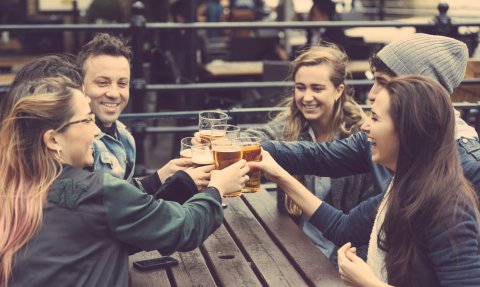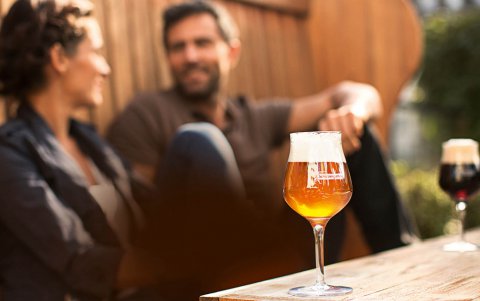
Knowledge
Drink together, not alone
BEER & CONVIVIALITY
What would attending a game or concert in a stadium be without the obligatory plastic cup full of beer – or a barbeque or even the Oktoberfest without a liter of the chilled effervescent blonde liquid?
It would be incomprehensible. Beer facilitates social interaction and – in the appropriate measure and with the right intent – imparts mirth and harmony. Speaking to one another, people come together, but beer binds us through friendship. We say for good reason, “Drink in brotherhood.” The fact that beer actually makes us more social and empathetic has now been proven in a study at the Universitätsspital Basel. “Those who drink a glass of beer recognize happy faces more rapidly and have a strong desire to be together with other people,” says Matthias Liechti, the director of the study. Toasting each other’s health together is much more preferable to nipping at a glass alone. Surveys have shown that in fact two-thirds of Austrians and Germans prefer to enjoy their beer with friends or acquaintances.

A BEER WITH THE EVENING MEAL
The reason people prefer to drink in good company is that beer has become less a staple food and more of a luxury. In the 19th century, the French writer and philosopher Jean Anthèlme Brillat-Savarin insisted that he had the right to drink even when he was not thirsty, because having a drink is more about taking a deep breath, relaxing and, above all, about enjoyment. All of this is typical of the “after-work beer”, which is now well established as both a term and an institution. The computer has been shut down. Now it’s time to relax. Invitations to a round of after-work drinks are practically ubiquitous in cities around the world. A glass of beer or wine and fine food, often accompanied by good music, is an effective means of leaving the stress of the workday behind. A couple of pleasant hours of with friends or colleagues lie ahead. Thomas Mann, one of Germany’s most important writers, also recognized the positive effects of an evening drink on the mind. In 1906, he wrote: “I (Geringer) drink a glass of pale beer at dinner every day and react to the one and a half quarts so strongly that it regularly drastically alters my mindset. It imbues in me a sentiment of “the day is done”. This brings about a feeling of elation that subsequently has an effect on the body. Moderate beer consumption – a maximum of one or two glasses now and again – can lower one’s risk of a heart attack, as the Univ.-Prof. of Neurology Dr. Manfred Walzl found in a study on the subject. Blood pressure, blood sugar and fat metabolism are also positively influenced by moderate drinking. >More on Beer & Health

MORE EXPRESSIVE THROUGH BEER
The reason that beer tends to make people more social was also revealed in the study at the university in Basel: alcohol elicits a response, which causes humans to be more open and loquacious. (In his most famous work Ulysses, James Joyce writes: “The sacred pint alone can unbind the tongue.”) Participants in the study, who viewed themselves as shy and reserved, felt subjectively more communicative after a glass of beer. Chatting and getting to know others is suddenly much easier and less strained, and social interaction is much more fun. This is evident again and again at, for instance, beer festivals and sporting events. In the countryside, legendary Stammtische (regular meetings of a set group of people in a tavern or inn) and Frühschoppen (a kind of Sunday brunch after church) have always been associated with mugs of beer. For most Austrians, Germans and Czechs as well, beer is an essential part of such gatherings. Whether the occasion is a celebration, a discussion or if a bowl of goulash is on the table, beer is an integral part of it. As long as everyone is enjoying their beer in moderation, a convivial gathering of kindred spirits is assured.

